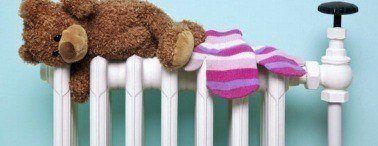
Heating Trends
Heating our homes is one of the most basic needs when it comes to home improvement and maintenance. Whether you use oil, natural gas or a combination, heating is vital. This is especially true if you live in an area with a cold climate.
Perhaps the biggest innovation of recent years is the heat pump. These devices allow you to heat your home by drawing geothermal heat from the surrounding ground. Working together with a gas or oil furnace, a heat pump can keep a home comfortable while saving a significant amount on utility bills. In addition, heat pumps work in two different ways. In the warmer months of spring and summer, a heat pump can actually draw heat out of the home and disperse it, keeping cooling bills low! Ask your contractor about incorporating a heat pump into your home; many experts feel that these devices are the future of home heating.
If your household is like many others, there are certain times of the night during which everybody is asleep, and times during the day in which nobody is home. Why heat the house to keep people comfortable if nobody is awake or home to enjoy it? Another very popular heating trend addresses this wasteful issue. Programmable thermostats allow you to set the heat lower during certain times. The most common are times when the household is asleep or gone for the day at work or school. While many homeowners have simply turned the heat down during these times for years, a programmable thermostat is a small investment that ensures you'll never forget.
Customizable HVAC systems are another huge current trend which can save money on your utility bills, make your home more comfortable, and even improve the health of your household. These systems handle the heating and cooling of your home, but they also do much, much more. You can choose from components which filter contaminants out of the air, regulate the moisture levels within your home, adjust the speed at which air flows through the system, and even expose air to UV lights to kill viruses and bacteria!
How many of these components you install should be a reflection of your household's needs. There's no need to install every bell and whistle available, but it only makes good sense to install what will be useful and beneficial. For example, if somebody in your home suffers from seasonal allergies, they will likely see a noticeable improvement after having the indoor air filtered. Pollen levels outside during certain times of the year are extremely high, but that doesn't mean that the pollen has to follow allergy sufferers indoors.
Common Heating Mistakes
Although the installation of your new heating system must be done by professionals, that doesn't mean that you as the homeowner can't do things to optimize...and impair...the systems' performance. Some of the following mistakes are based on myths, some seem like common sense and some are simple matters of maintenance.
Failure to Seal Your Home
Even though it can account for a significant portion of your home's heat loss, many homeowners neglect to seal their homes properly. This is unfortunate, because the process is simple and can easily be done on a DIY basis.
Checking for leaks is easiest during the winter, when cold air coming in through cracks is more obvious. However, you can hire a pro anytime during the year to test your home for air leaks, after which you can choose to seal those leaks yourself or hire somebody to do it for you.
The most common places for air leaks include around windows and doors, around duct work and vents, near floorboards on walls which face the outdoors and around interior attic entrances. Depending on where you find leaks, they can be sealed by using plaster, grout or another applicable product.
If you find a large number of leaks around your windows, you may have to look into replacing them in order to get the most value out of your new heating system. In some cases, sealing the frames tightly is all that's required; in other cases (especially in the case of an older home) a total replacement is more cost-efficient.
Leaving Fireplaces Open
While a cozy fire may seem like a great way to heat your home on chilly nights, don't make the mistake of forgetting to close the flue. A fireplace, and the chimney attached to it, is a direct line for cold outdoor air to enter your home. Simply closing the flue can allow you to enjoy your fireplace without wasting energy after the fire goes out.
If you find that you can feel a draft even after you've closed the flue, it may be time to call in a pro to check your fireplace and chimney. Older models are notorious for energy loss, but they can be improved. Another option is to install a new fireplace, which can retain the traditional appearance you love while being tightly sealed against heat loss. Consider how often you use your fireplace before investing, and choose the option which makes the most financial sense for your household.
Cranking Up the Heat
When you get home after work, your home will feel cooler if you've been setting the temperature down while the house is empty. While it sounds like a great idea to turn the thermostat way up into the seventies in order to heat the house quickly, this is actually a myth. Turning the heat up to ninety degrees won't get your house warm any faster. When you return home, simply turn the thermostat back to a comfortable temperature and wait for the house to warm up. It will take the same amount of time, and won't waste any energy.
If you can't stand a chilly house, even for a few minutes, you can program your thermostat to begin raising the temperature around the time you usually arrive home. Only use this option if you regularly get home at the same time each day, otherwise you'll still be heating an empty house.
Poor Maintenance
Possibly the biggest and most common mistake of all is installing a brand new, energy-efficient heating system and thinking that it will take care of itself. Whether it's a matter of forgetfulness or of assuming that newer systems are maintenance-free, this mistake costs homeowners a great deal in lost energy each year.
Experts recommend having your ducts and vents professionally flushed out, cleaned and inspected each year. If you have pets or live in an area with particularly polluted air, this can be increased to twice a year.
During your regular household cleaning, be sure to use a vacuum to keep the exterior of vents clear. Be sure not to block vents with furniture or draperies. By practicing regular maintenance, you'll find that your heating system works more effectively and efficiently, keeping your home more comfortable and saving you money at the same time.
Choosing Too-Large Systems
When shopping for a new heating system, many homeowners make the mistake of choosing the largest they can find. Often these are the most advanced models, with the most bells and whistles. However, most homeowners don't realize that the size of your house directly relates to the proper size of your heating and HVAC system. A system which is too large will not operate at peak efficiency. In fact, it can create an environment with too much moisture, in addition to drawing too much power. Before you purchase a unit, consult with your contractor or another knowledgeable professional to ensure that you choose the correct size.
Finding the Best HVAC Professionals
Since working on any type of HVAC equipment (which includes heating, cooling, filtration and most other elements of air quality control) is such intricate work, a license is required in nearly all areas. In these areas, it is illegal to perform any work on HVAC equipment without a license. In some cases, just opening up an exterior air conditioning unit can result in a voided warranty and insurance issues.
For this reason, it's essential that you choose carefully when hiring a professional for your new heating system installation. Thankfully, this process has been made much less intimidating with the popularity of home improvement websites.
On these sites, you can look through local HVAC professionals, viewing important criteria such as licensing, insurance and years of experience in the industry. You can also read reviews written by former clients. These reviews can be particularly helpful; as they give you an inside look as to how a professional really operates when on a job. Are they prompt? Polite? Ethical? Reviews can answer all these questions and more.
Once you've found a few promising options, start making phone calls. Check with references, and ask to see copies of a current license and insurance coverage, just to be sure. With potentially hazardous work, it never hurts to be certain.
Posted by: Diane Sheppard





